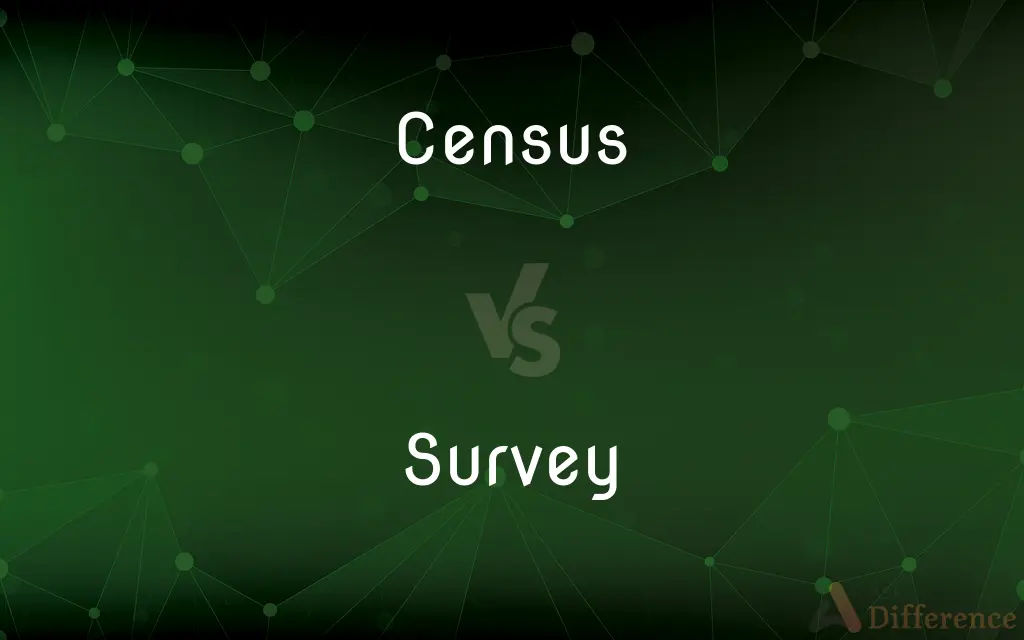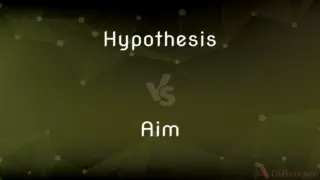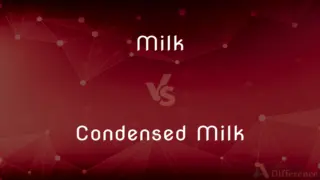Census vs. Survey — What's the Difference?
By Tayyaba Rehman — Published on October 2, 2023
A census counts the entire population, collecting specific data. A survey samples a portion of the population, gathering varied information.

Difference Between Census and Survey
Table of Contents
ADVERTISEMENT
Key Differences
A census and a survey are both valuable tools in data collection, yet they serve different purposes and employ distinct methodologies. A census is an official count, typically conducted by governments, aimed at enumerating every individual in a particular population. Surveys, on the other hand, are conducted on a sample of the population, not necessarily by governmental entities, to infer or deduce information about the larger group.
In terms of coverage, a census seeks to reach every individual or unit within its target group. This comprehensive approach ensures that every entity is accounted for, yielding a complete data set. Surveys, conversely, gather data from a subset of the population, making generalizations about the entire group based on this sample.
The frequency of conducting a census and a survey can vary. Typically, censuses are taken at regular, longer intervals due to their expansive nature, such as every ten years in the case of the U.S. population census. Surveys can be more flexible, conducted as frequently as needed, depending on the research question or objective.
The type of data collected also distinguishes a census from a survey. While a census might focus on specific demographic data like age, gender, and occupation, surveys can cover a wider range of topics, from consumer preferences to opinions on social issues.
To summarize, while both a census and a survey are instrumental in understanding populations and trends, the breadth of coverage, frequency, and types of data collected set them apart. Both have their unique advantages, dictated by their specific goals.
ADVERTISEMENT
Comparison Chart
Coverage
Entire population
Subset or sample of the population
Frequency
Regular, longer intervals (e.g., every ten years)
Flexible, as frequently as needed
Data Collected
Specific demographic data (e.g., age, gender)
Varied topics (e.g., opinions, preferences)
Conducted By
Typically governmental entities
Can be anyone (researchers, businesses, etc.)
Purpose
Official count of the entire population
Gather information to infer about the larger group
Compare with Definitions
Census
A detailed record of specific demographic data.
The latest census showed an increase in urban dwellers.
Survey
A detailed study of a specific topic.
The survey on dietary habits revealed interesting trends.
Census
A governmental activity for policy-making.
The census data informed the infrastructure development plans.
Survey
A method of inquiry to draw conclusions.
The health survey indicated a need for more wellness programs.
Census
An official count of the population.
The government conducts a census every ten years.
Survey
To look over the parts, features, or contents of; view broadly
Surveyed the neighborhood from a rooftop.
Surveyed the shelves in the pantry.
Census
A complete enumeration of entities.
The plant census indicated a decline in native species.
Survey
To look at or examine carefully and appraise
Surveyed the storm damage. ].
Census
A census is the procedure of systematically calculating, acquiring and recording information about the members of a given population. This term is used mostly in connection with national population and housing censuses; other common censuses include the census of agriculture, and other censuses such as the traditional culture, business, supplies, and traffic censuses.
Survey
The act of surveying; a general view.
Census
An official, usually periodic enumeration of a population, often including the collection of related demographic information.
Survey
A particular view; an examination, especially an official examination, of a particular group of items, in order to ascertain the condition, quantity, or quality.
A survey of the stores of a ship; a survey of roads and bridges; a survey of buildings.
Census
In ancient Rome, a count of the citizens and an evaluation of their property for taxation purposes.
Survey
The operation of finding the contour, dimensions, position, or other particulars of any part of the Earth's surface.
Census
To include in a census; conduct a census of
"Every plant one centimeter in diameter or larger is censused every five years" (John P. Wiley, Jr.).
Survey
A measured plan and description of any portion of country.
The owners of the adjoining plots had conflicting surveys.
Census
An official count or enumeration of members of a population (not necessarily human), usually residents or citizens in a particular region, often done at regular intervals.
Survey
An examination of the opinions of a group of people.
The local council conducted a survey of its residents to help it decide whether to go ahead with the roadside waste collection service.
Census
Count, tally.
Survey
A questionnaire or similar instrument used for examining the opinions of a group of people.
I just filled out that survey on roadside waste pick-up.
Census
(transitive) To conduct a census on.
Survey
(historical) An auction at which a farm is let for a lease for lives.
Census
(intransitive) To collect a census.
Survey
(US) A district for the collection of customs under a particular officer.
Census
A numbering of the people, and valuation of their estate, for the purpose of imposing taxes, etc.; - usually made once in five years.
Survey
To inspect, or take a view of; to view with attention, as from a high place; to overlook
He stood on a hill, and surveyed the surrounding country.
Census
An official registration of the number of the people, the value of their estates, and other general statistics of a country.
Survey
To view with a scrutinizing eye; to examine.
Census
A period count of the population
Survey
To examine with reference to condition, situation, value, etc.; to examine and ascertain the state of
It was his job to survey buildings in order to determine their value and risks.
Census
Conduct a census;
They censused the deer in the forest
Survey
To determine the form, extent, position, etc., of, as a tract of land, a coast, harbor, or the like, by means of linear and angular measurements, and the application of the principles of geometry and trigonometry
To survey land or a coast
Census
An official process of gathering national statistics.
Citizens were urged to participate in the upcoming census.
Survey
To examine and ascertain, as the boundaries and royalties of a manor, the tenure of the tenants, and the rent and value of the same.
Survey
To investigate the opinions, experiences, etc., of people by asking them questions; to conduct a survey; to administer a questionnaire.
Survey
To inspect, or take a view of; to view with attention, as from a high place; to overlook; as, to stand on a hill, and survey the surrounding country.
Round he surveys and well might, where he stood,So high above.
Survey
To view with a scrutinizing eye; to examine.
With such altered looks, . . . All pale and speechless, he surveyed me round.
Survey
To examine with reference to condition, situation, value, etc.; to examine and ascertain the state of; as, to survey a building in order to determine its value and exposure to loss by fire.
Survey
To determine the form, extent, position, etc., of, as a tract of land, a coast, harbor, or the like, by means of linear and angular measurments, and the application of the principles of geometry and trigonometry; as, to survey land or a coast.
Survey
To examine and ascertain, as the boundaries and royalties of a manor, the tenure of the tenants, and the rent and value of the same.
Survey
The act of surveying; a general view, as from above.
Under his proud survey the city lies.
Survey
A particular view; an examination, especially an official examination, of all the parts or particulars of a thing, with a design to ascertain the condition, quantity, or quality; as, a survey of the stores of a ship; a survey of roads and bridges; a survey of buildings.
Survey
The operation of finding the contour, dimensions, position, or other particulars of, as any part of the earth's surface, whether land or water; also, a measured plan and description of any portion of country, or of a road or line through it.
Survey
A detailed critical inspection
Survey
Short descriptive summary (of events)
Survey
The act of looking or seeing or observing;
He tried to get a better view of it
His survey of the battlefield was limited
Survey
Consider in a comprehensive way;
He appraised the situation carefully before acting
Survey
Look over in a comprehensively, inspect;
He surveyed his new classmates
Survey
Keep under surveillance;
The police had been following him for weeks but they could not prove his involvement in the bombing
Survey
Hold a review (of troops)
Survey
Make a survey of; for statistical purposes
Survey
Plot a map of (land)
Survey
An examination of opinions or experiences.
The customer satisfaction survey yielded positive feedback.
Survey
A method to gather information from a sample group.
Researchers conducted a survey to understand youth voting patterns.
Survey
An overview or general inspection.
The land survey confirmed the property's boundaries.
Common Curiosities
Can surveys be conducted by private companies?
Yes, surveys can be conducted by anyone, including private companies, researchers, and individuals.
What is the main difference between a census and a survey?
A census counts the entire population, while a survey samples a portion of the population.
What is the primary purpose of a census?
A census aims to count and gather data on the entire population.
How frequently are surveys typically conducted?
Surveys can be conducted as often as needed, based on the research objective.
Is participation in the U.S. population census mandatory?
Yes, participation in the U.S. population census is mandatory by law.
Share Your Discovery

Previous Comparison
Hypothesis vs. Aim
Next Comparison
Milk vs. Condensed MilkAuthor Spotlight
Written by
Tayyaba RehmanTayyaba Rehman is a distinguished writer, currently serving as a primary contributor to askdifference.com. As a researcher in semantics and etymology, Tayyaba's passion for the complexity of languages and their distinctions has found a perfect home on the platform. Tayyaba delves into the intricacies of language, distinguishing between commonly confused words and phrases, thereby providing clarity for readers worldwide.














































